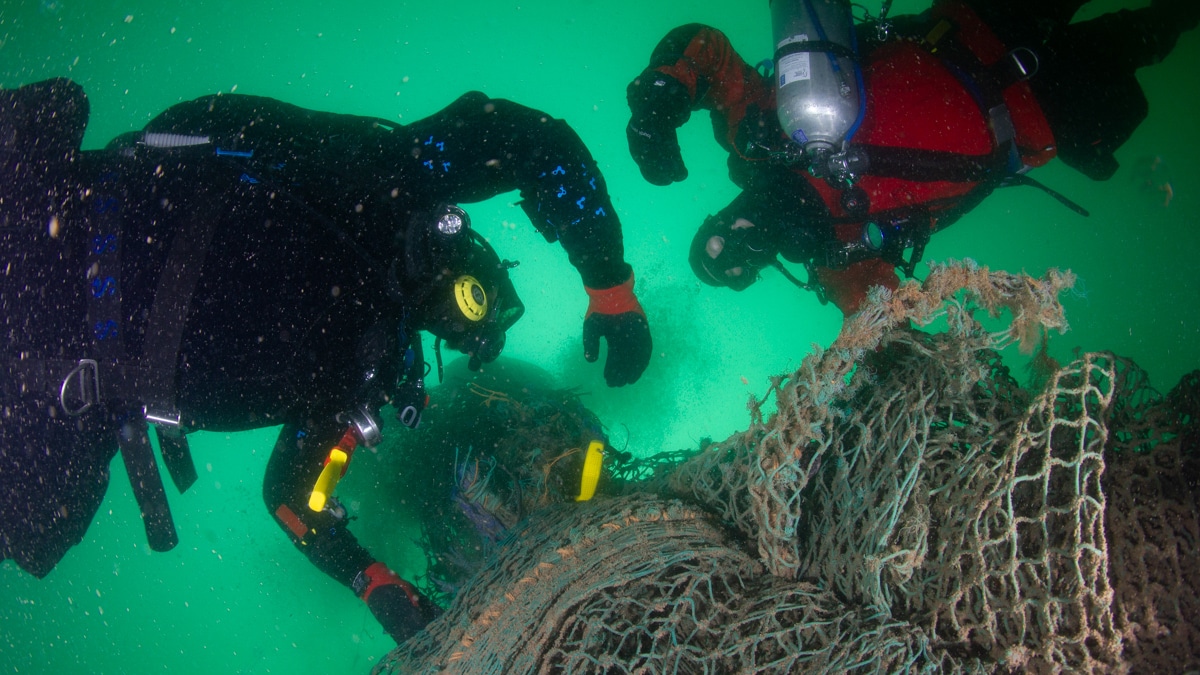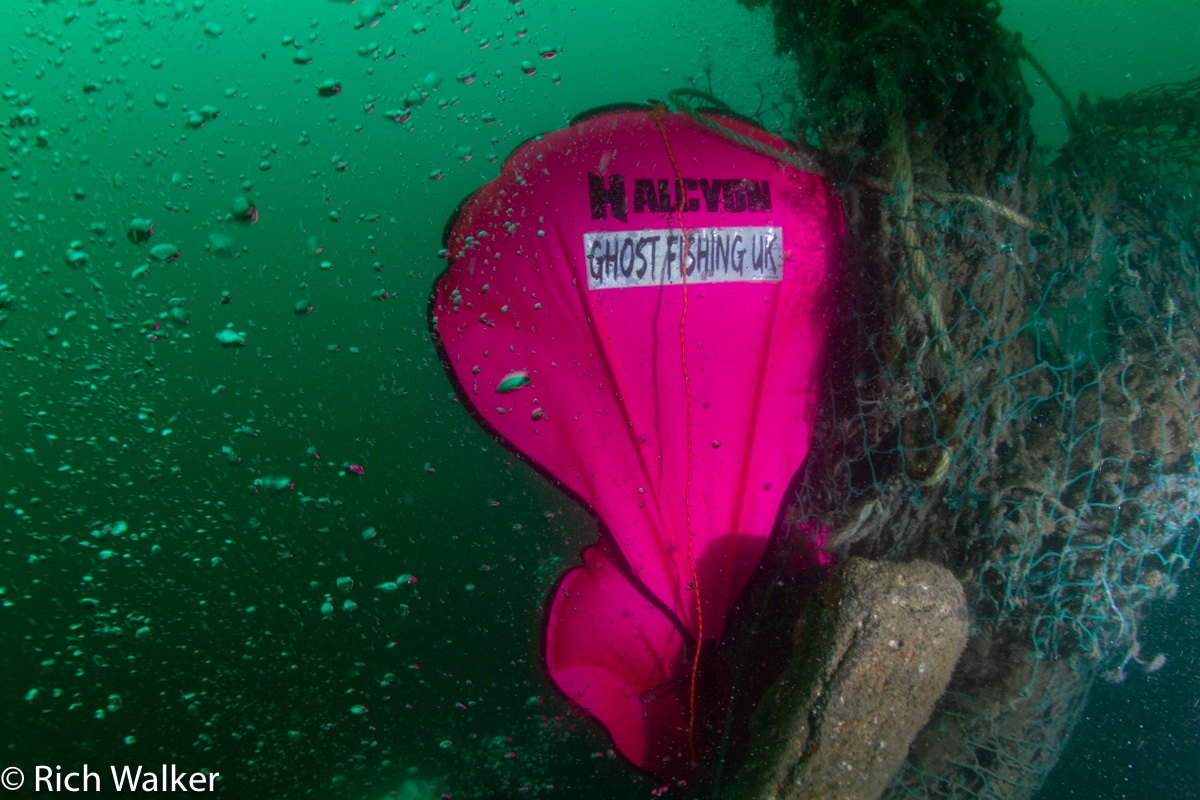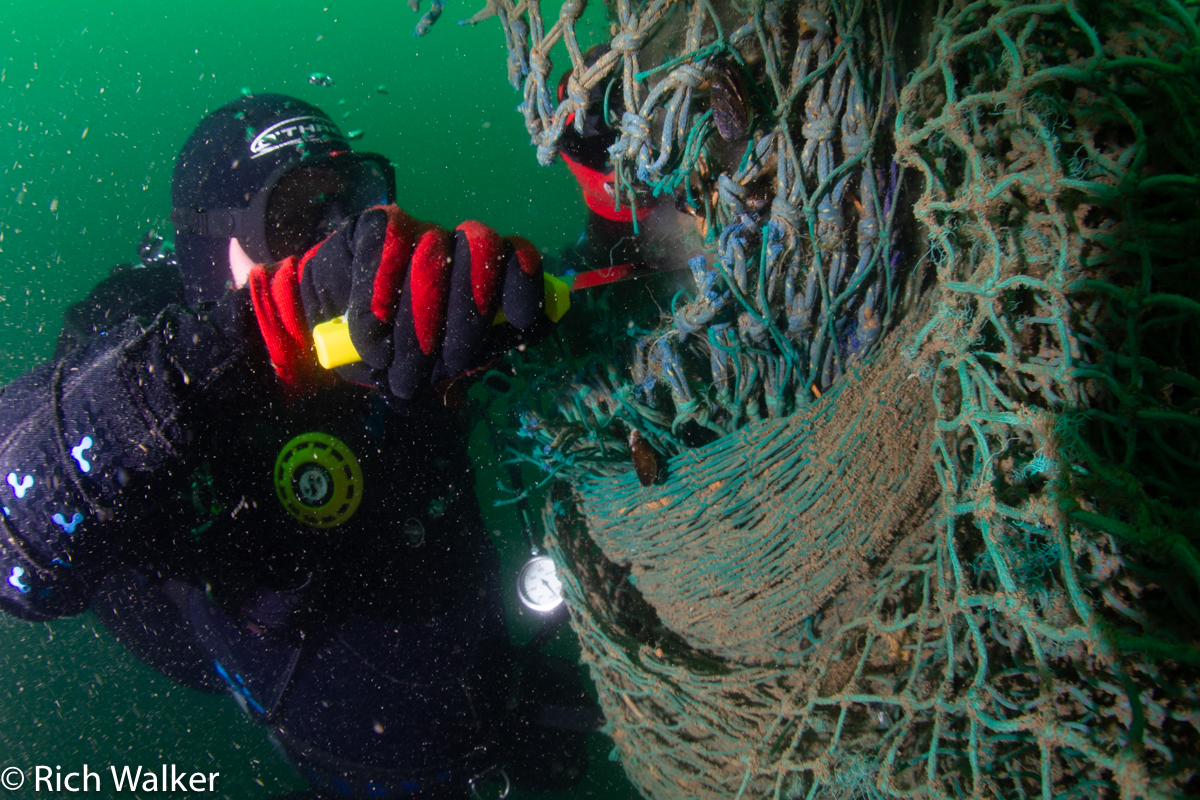Marine Life & Conservation
Ghost Fishing UK clean up at the Plastic Free Awards

![]() The ocean conservation charity Ghost Fishing UK has netted the ‘Best Plastic Campaign’ prize at the ‘Plastic free Awards 2021’ for their voluntary work cleaning up our oceans of lost fishing gear.
The ocean conservation charity Ghost Fishing UK has netted the ‘Best Plastic Campaign’ prize at the ‘Plastic free Awards 2021’ for their voluntary work cleaning up our oceans of lost fishing gear.
It is estimated that 640,000 tonnes of lost fishing gear or ‘ghost gear’ is lost into our oceans each year. Modern fishing gear is primarily made of plastics and not only continues catching and killing wildlife once it has been lost, but leaves a legacy issue of broken down plastic circulating in our oceans. These fragments known as microplastics can be ingested by animals and ultimately end up in our food chain.
The Plastic Free Awards returned for their second year to celebrate those making the biggest waves in the fight against plastic pollution. The awards are a unique opportunity to recognise the achievements of campaigners, innovators, small businesses and communities across the UK leading the charge on plastic.
Partnering with Iceland Foods Charitable Foundation, the awards are designed to bring together environmental champions and leaders of the plastic free movement. With 12 award categories covering all areas from Best Plastic Campaign to Youth Activist Award, anyone can be nominated; yourself, a friend, family member, school, community, or business – anyone you think is a plastic free hero. Shortlisted nominees are chosen by a panel of expert judges.
Volunteer divers from the charity Ghost Fishing UK are carefully selected to survey and recover lost fishing gear which is reported through their website. Both divers and fishermen are invited to report fishing gear losses so the team can recover them, stopping the cycle of death and pollution in its tracks.
The materials are then stored until they reach sufficient quantities to be recycled into various items, including plant pots.
Operations Officer and trustee for the charity Fred Nunn is based in Cornwall and said: “It’s so humbling to be recognised by the community when there are so, so many others all doing truly amazing things all towards a common goal.”
Scuba divers who make the grade are put through an intensive training course over three days to prepare them for dealing with ghost nets. The job underwater can be dangerous, often with poor visibility, hard physical work and the ever present risk of the divers becoming entangled in the nets themselves.
On the day of the awards ceremony, many of the divers missed the event as they were finishing up a project in Brighton to remove a huge net form the wreck of the Cairndhu, operating from Channel Diver. They were assisted by a trawling vessel who heard the team were in the area and offered to help, using his fishing boat to haul the net on board. The fishermen are hoping to be able to repair and re-use the net depending on how badly it has been damaged whilst entangled in the wreck. If not, the net will be sent for recycling.
Trustee Christine Grosart said: “Today was a fantastic day! It was brilliant to have a trawling vessel offer assistance to our mission to get the net off the Cairndhu but to go on and win this award in the evening was the cherry on the cake.
Many people think we do this for a living but we don’t – we all have day jobs, families and normal lives to work around. It takes special individuals to give up what free time and cash they have spare to this cause and that is why they are so deserving of this award.
I was watching the awards from the middle of the Danish north sea on board a sat diving vessel and they could hear me shrieking from the Bridge!”
Chair Dr Richard Walker was also out on Channel Diver, photographing the day’s mission as it unfolded. He was travelling home when the winners were announced: “To actually win this award means more to me than you can imagine. It means that I can publicly thank all of our dedicated volunteers, who scuba dive to recover lost fishing nets from the reefs and shipwrecks around the United Kingdom and the huge contribution that our divers make in keeping the projects happening.
I can praise our instructors who teach our divers how to be safe and effective on our projects and show my appreciation to our committee who look after our administration, who send our message to the public, who make links with the fishing community and other groups.”
Ghost Fishing UK this weekend is rolling out a new reporting system dedicated to fishermen and fishing vessels to be able to report lost fishing gear anonymously. The charity is very keen to work with the fishing community in harmony to help solve the problem of ghost fishing by getting accidentally lost gear out of the sea as soon as possible.
To report lost fishing gear, please head to the charity’s website: www.ghostfishing.co.uk/report
If you are a fisherman and know of any lost fishing gear, please report it anonymously here:
Ghost Fishing UK – Fishing Community Reporting Form
Richard Walker said “I want to thank each and every one of the Ghost Fishing UK team, and all of our supporters. They are all a key part of the job to reduce our dependence on plastics and preventing it from getting into our beautiful oceans.
And finally, a big thank you to the Surfers Against Sewage and the Plastic Free Awards for this prestigious award.”
For more information about Ghost Fishing UK visit their website by clicking here.
Header image: Richard Walker
Marine Life & Conservation
Paul Watson Released as Denmark Blocks Japan’s Extradition Bid

Renowned anti-whaling activist Paul Watson has been released from custody in Greenland after spending five months in detention. Denmark’s Justice Ministry rejected Japan’s request for his extradition, citing insufficient guarantees that his time already served in custody would be credited against any potential sentence.
The 74-year-old Canadian-American was arrested on July 21 in Nuuk, Greenland’s capital, when his ship docked to refuel. His arrest was based on a 2012 Japanese warrant related to a 2010 encounter in Antarctic waters. Japan alleged Watson obstructed operations and caused damage to a whaling research ship during efforts to disrupt illegal whaling. Watson has consistently denied these claims, maintaining his commitment to marine conservation.
Denmark, which oversees extradition matters for Greenland, concluded that while the legal conditions for extradition were met, the lack of assurances from Japan regarding time-served credit made extradition untenable.
In a video shared by his foundation, Watson expressed gratitude and relief, saying, “After five months, it’s good to be out… and good to know they’re not sending me to Japan.” He added that the most difficult part of his time in custody was being separated from his two young sons.
Watson is a pioneering figure in marine conservation, known for founding the Captain Paul Watson Foundation in 2022 after decades of activism with the Sea Shepherd Conservation Society. His bold efforts to defend marine life have earned him widespread support, including from celebrities and conservationists. His work has also been featured in the acclaimed reality TV series Whale Wars.
Watson’s lawyer, Jonas Christoffersen, praised the decision, stating, “We are happy and relieved that Paul Watson is now free.” He added that Watson is eager to reunite with his family and continue his vital work.
The arrest occurred while Watson’s vessel, the M/Y John Paul DeJoria, was en route to the North Pacific with a team of 26 volunteers to intercept a Japanese whaling ship. His foundation described the arrest as politically motivated and emphasized that Watson’s actions were focused on ending illegal whaling practices.
Japan resumed commercial whaling in 2019 after leaving the International Whaling Commission, asserting that whale meat is a cultural tradition. Conservationists, however, continue to challenge these practices, highlighting their impact on marine ecosystems.
Despite the challenges, Watson remains steadfast in his mission to protect marine life and bring attention to whaling practices. His dedication to ocean conservation has made him a globally respected advocate for the environment.
Marine Life & Conservation
12 Days of Zero-Waste Fish-mas

This holiday period, the Marine Conservation Society, the UK’s leading ocean membership charity, invites you to make some simple changes to eating fish this Christmas to help our seas.
Dr Kenneth Bodles, Head of Fisheries and Aquaculture at the Marine Conservation Society, said, “During the festive season, our consumption increases, but so does waste. Sustainability isn’t just about where food comes from – it’s also about how you use it. By reducing waste and making the most out of your seafood, you’re not only taking steps to be more ocean-friendly, but can also help to cut costs during what is often one of the most expensive times of the year”.
The Marine Conservation Society has compiled twelve tips on how to consume seafood sustainably with zero-waste this Christmas:
Buy whole fish instead of fillets
Instead of fillets, consider buying whole fish such as salmon, hake, or lemon sole. By adopting a “nose to tail” approach with cooking, whole-baked fish not only feeds a crowd, but also helps to minimise waste and maximise sustainability by using up every part of the animal, including bones, skin, and fat.
Make fish stock
Leftover fish bones or shells can be put to good use by boiling them to make a nourishing fish stock or bisque. This can be frozen and preserved for later use and makes for a flavourful base in a soup.
Make your own fish pâté
Avoid waste by turning leftover fish, such as smoked mackerel or salmon, into a delicious pâté by blending with cream cheese and lemon. Perfect when paired with crackers.
The sustainability of salmon and mackerel varies depending on where and how it is caught or farmed. For more information on green-rated options, check the charity’s Good Fish Guide.
Buy frozen
By purchasing seafood that is frozen or vacuum-packed, this helps to reduce waste by extending the shelf life of your food.
Fish pie
If you’re wondering what to do with leftover cooked fish, why not opt for a classic fish pie with mashed potatoes, leeks, and a cheesy sauce? A sure crowd pleaser on Boxing Day.
Use the head
Don’t forget the fish head! The meat is incredibly tender and flavourful. The charity recommends a cod’s head curry or recreating Fallow’s renowned cod’s head in siracha butter.
By stretching your ingredients further, not only is this a more sustainable way to enjoy seafood, but also cost-effective by repurposing leftovers and cooking creatively.
Boxing Day brunch
Mix leftover kippers or smoked salmon with scrambled eggs for a tasty, zero-waste, Boxing Day brunch.
For best choice, make sure you buy kippers, or herring, from the North Sea and the North Irish Sea.
Zero-waste storage
A top tip from the Marine Conservation Society to avoid waste is freezing fish offcuts to save for future use.
Crisp up the skin
Even leftover fish skin can be turned into a quick savoury snack by crisping it up in an air fryer with a little olive oil and salt.
Anchovies two ways
Leftover anchovies can either be blended with butter to make a delicious anchovy butter or tossed into pasta for a hit of umami flavour.
The charity recommends opting for anchovies caught in the Bay of Biscay for best choice.
Fishcakes
For an easy, zero-waste meal, leftover seafood trimmings can be mixed with mash and fried in breadcrumbs to make fishcakes.
Pickled mussels
Try pickling mussels in 1:1 vinegar and water, with a dash of sugar for a sustainable, zero-waste snack that can be enjoyed well beyond the festive season.
Mussels farmed in the UK are a seafood superhero. Grown using low-impact methods and harvested by hand, they get all the food they need from the sea around them. This makes them one of the most sustainable, ocean-friendly, and cost-effective seafood options.
Players of People’s Postcode Lottery have raised £6.6M towards the Marine Conservation Society’s vital work in making seafood more sustainable.
Laura Chow, Head of Charities at People’s Postcode Lottery, said: “Fish is a festive favourite for many, but making sustainable choices when it comes to how we buy and eat seafood makes all the difference for our ocean. Support from players of People’s Postcode Lottery has helped the Marine Conservation Society further its sustainable seafood work, so that we can all enjoy healthier, better protected seas.”
The Marine Conservation Society encourages you to make sustainable seafood choices a year-round habit, not just for Christmas. To check how sustainable the seafood on your plate is, you can visit the charity’s Good Fish Guide. The Guide helps consumers and businesses identify the most sustainable seafood using a simple traffic light system, based on where and how species are caught or farmed. Green is the best choice, amber means improvements are needed, and red indicates fish to avoid buying.
Zero-waste gift idea
Why not embrace a zero-waste Christmas by gifting a membership to support marine conservation? It’s a meaningful, low-waste gift that helps protect our ocean for generations to come. Memberships start from as little as £5 a month – the price of a sandwich and drink from your local coffee shop.
Find the latest sustainable seafood advice for wild-caught and farmed seafood on the Good Fish Guide, downloadable to your phone from www.mcsuk.org/goodfishguide.
-

 News2 months ago
News2 months agoIconic SS United States to become the World’s Largest Artificial Reef
-

 News3 months ago
News3 months agoBook Review – 52 Assignments: Underwater Photography
-

 Gear News3 months ago
Gear News3 months agoDYNAMICNORD – New German diving brand enters the British market
-

 News3 months ago
News3 months agoExploring Cenote El Pit: A Diver’s Dream
-

 Gear News3 months ago
Gear News3 months agoTry BARE drysuits (and maybe even win one!) this Friday with Sea & Sea at North West Dive Fest
-

 Marine Life & Conservation3 months ago
Marine Life & Conservation3 months agoBook Review: Coral Triangle Cameos
-

 Blogs2 months ago
Blogs2 months agoDive the Egyptian Red Sea this Autumn with Regaldive
-

 News3 months ago
News3 months ago2024 Ocean Art Underwater Photo Competition Announced

















